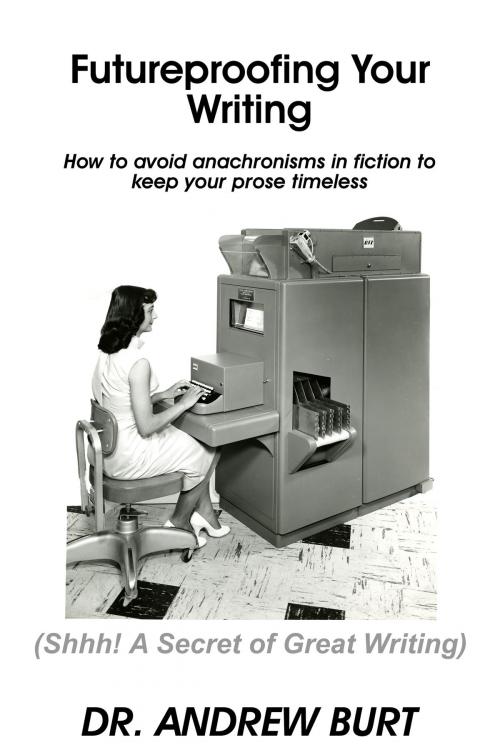Futureproofing Your Writing: How to avoid anachronisms in fiction to keep your prose timeless
Nonfiction, Reference & Language, Language Arts, Writing & Publishing, Composition & Creative Writing| Author: | Andrew Burt | ISBN: | 9781370900640 |
| Publisher: | Andrew Burt | Publication: | November 25, 2016 |
| Imprint: | Smashwords Edition | Language: | English |
| Author: | Andrew Burt |
| ISBN: | 9781370900640 |
| Publisher: | Andrew Burt |
| Publication: | November 25, 2016 |
| Imprint: | Smashwords Edition |
| Language: | English |
How to avoid anachronisms in fiction to keep your prose timeless...
So you're reading along in the Bourne Ultimatum, you're with Jason Bourne on the run, he's caught sneaking out to the car—interrogated by the baddies—and boom, he says, "I'm just driving out on the highway to find a phone, that's all." He what? Doesn't he have a cell phone? While in 1991 there were no cell phones to speak of, today it's awkward for a character not to have one, and this leaves the reader feeling the story is dated, or at least wondering why such a notable absence isn't explained. Yet it could have been easily avoided.
Technology changes so fast—and changes life so fast—that if you aren't careful as a writer, your masterpiece could quickly sound dated, and needlessly rob you of readers and sales. You can't avoid technology, as that can be just as bad; though with a few careful choices of words you can lengthen the shelf-life of your work. It used to be only science fictional accounts of the future that became outdated as tomorrow rolled in, but now unless you're writing in a historical time period, the pace of change is so rapid that stories intended to be set in the modern day may be dated by the time readers see them.
Science fiction is even more prone to this problem, when fictional technologies become real—but not in the way described—or, worse, are bypassed and laughably unreal.
The good news is that, other than the Major Assumptions of your story (such as faster than light travel), chances are little of your story truly relies on you nailing down specifics about many things that might get outdated, nor would they be harmed if you described them more generically. Your story is uniquely yours anyway, so carefully sidestepping pitfalls won't hurt your story, only make it more robust. This book presents techniques to "futureproof" your writing, whether set in the distant future or the ever-changing "modern day."
How to avoid anachronisms in fiction to keep your prose timeless...
So you're reading along in the Bourne Ultimatum, you're with Jason Bourne on the run, he's caught sneaking out to the car—interrogated by the baddies—and boom, he says, "I'm just driving out on the highway to find a phone, that's all." He what? Doesn't he have a cell phone? While in 1991 there were no cell phones to speak of, today it's awkward for a character not to have one, and this leaves the reader feeling the story is dated, or at least wondering why such a notable absence isn't explained. Yet it could have been easily avoided.
Technology changes so fast—and changes life so fast—that if you aren't careful as a writer, your masterpiece could quickly sound dated, and needlessly rob you of readers and sales. You can't avoid technology, as that can be just as bad; though with a few careful choices of words you can lengthen the shelf-life of your work. It used to be only science fictional accounts of the future that became outdated as tomorrow rolled in, but now unless you're writing in a historical time period, the pace of change is so rapid that stories intended to be set in the modern day may be dated by the time readers see them.
Science fiction is even more prone to this problem, when fictional technologies become real—but not in the way described—or, worse, are bypassed and laughably unreal.
The good news is that, other than the Major Assumptions of your story (such as faster than light travel), chances are little of your story truly relies on you nailing down specifics about many things that might get outdated, nor would they be harmed if you described them more generically. Your story is uniquely yours anyway, so carefully sidestepping pitfalls won't hurt your story, only make it more robust. This book presents techniques to "futureproof" your writing, whether set in the distant future or the ever-changing "modern day."















